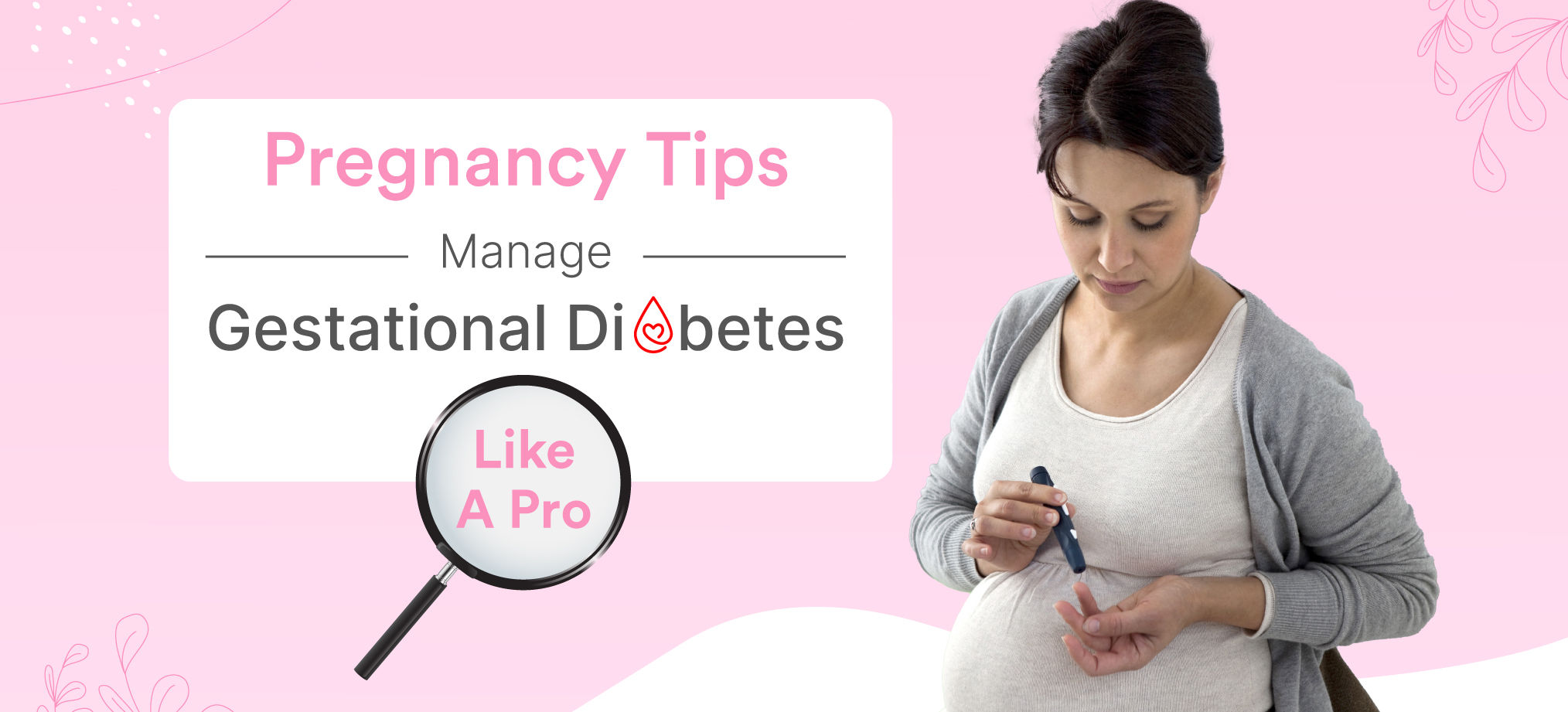Women's Wellness
Diet And Exercise Tips To Deal With Gestational Diabetes
3 min read
By Apollo 24|7, Published on - 31 March 2023, Updated on - 11 February 2025
Share this article
0
0 like

Though exhilarating, pregnancy is equally stressful. Research says 2% to 10% of all pregnant women develop gestational diabetes every year. While the diagnosis of gestational diabetes can be concerning, one should know how to manage it to protect the unborn baby from its potential. Let us know more about the condition and how to manage it. 
What is Gestational Diabetes?
Diabetes that occurs during pregnancy is known as gestational diabetes. It happens when the body cannot make enough insulin to control blood sugar levels, resulting in a blood sugar level rise. This can be a problem for both the mother and the unborn child. Obesity, a history of diabetes in the family, and being older than 25 years are some of the most typical risk factors associated with gestational diabetes.
Tips to Manage Gestational Diabetes
Here are some simple strategies to help you manage gestational diabetes and deliver a healthy baby.
1. Follow a Balanced Diet
When treating gestational diabetes, it's critical to stick to a nutritious diet. Whole grains, lean meat, essential fats, and an assortment of fruits and vegetables should be included in the diet. It's essential to prevent taking too many calories or carbs as both can cause blood sugar levels to rise.
Eating frequent, small meals every day can avoid blood sugar peaks and troughs. It's also important to watch serving sizes because overeating might also spike blood sugar levels. The low glycaemic index (GI) food options such as whole cereals, nuts, seeds, lentils, and non-starchy veggies can help manage blood sugar levels efficiently.
Also, it's important to stay away from refined carbohydrates, sweet drinks, sweets, and other high-sugar products. Interacting with a certified nutritionist can help customise a food plan to manage gestational diabetes.
Recommended read : Benefits of a glucose test during the second trimester
2. Stay Physically Active
Staying physically active is crucial when managing gestational diabetes. Exercise helps regulate blood sugar levels and can improve overall health. Aiming for at least 30 minutes of moderate exercise most days of the week is recommended. Some safe exercises during pregnancy include walking, swimming, and prenatal yoga.
Talking to your doctor before starting any exercise programme during pregnancy is essential. Your doctor can help you determine what type and amount of exercise is safe for you and your baby.
3. Monitor Blood Sugar Levels
Regular monitoring of blood sugar levels is crucial when managing gestational diabetes. Your doctor may recommend checking blood sugar levels either several times a day, before breakfast, or after meals. Recording the reading would help the doctor determine the course of treatment.
For instance, if blood sugar levels are consistently high, then your doctor may recommend insulin therapy to help regulate blood sugar levels. Notably, insulin therapy is safe during pregnancy and can help prevent complications for both the mother and the baby.
4. Attend Regular Prenatal Appointments
Controlling gestational diabetes requires regular attendance at prenatal check-ups. If you have gestational diabetes, the doctor would diligently monitor the health of your baby throughout the gestation. They can suggest further exams like foetal monitoring or ultrasounds to ensure your baby is developing and maturing properly.
Gestational diabetes can be challenging to manage but following these simple steps can help ensure a healthy pregnancy and baby. Working closely with your doctor to develop a personalised treatment plan and monitoring your health throughout your pregnancy is essential. By staying active, eating a balanced diet, monitoring blood sugar levels, attending regular prenatal appointments, following a treatment plan, seeking emotional support, and staying positive and focused, you can manage gestational diabetes efficiently. For more questions,
Also read: Diabetes During Pregnancy - How Ayurveda Can Help?
Consult Apollo's Expert Gynaecologists
Medically reviewed by Dr Sonia Bhatt.
Leave Comment
Recommended for you

Women's Wellness
Can Menopause Contribute to the Development of Osteoporosis?
Research shows that women can lose about 20% of bone mass in the first five to seven years post-menopause.

Women's Wellness
Foods To Avoid During Your Period
Period pain is extremely common. While it is a normal phenomenon, it can be unbearable at times. Read to know about certain foods that are best avoided during the menstrual cycle.

Women's Wellness
5 Best Ways to Help Ease Leg Cramps During Pregnancy
Hormonal changes, gaining weight, back pain, and leg cramps are just some of the difficulties a pregnant woman faces. Our medical experts have created a list of the top 5 easy hacks to help pregnant women cope with the agony of leg cramps. Check out this blog now!
Subscribe
Sign up for our free Health Library Daily Newsletter
Get doctor-approved health tips, news, and more.
Recommended for you

Women's Wellness
Can Menopause Contribute to the Development of Osteoporosis?
Research shows that women can lose about 20% of bone mass in the first five to seven years post-menopause.

Women's Wellness
Foods To Avoid During Your Period
Period pain is extremely common. While it is a normal phenomenon, it can be unbearable at times. Read to know about certain foods that are best avoided during the menstrual cycle.

Women's Wellness
5 Best Ways to Help Ease Leg Cramps During Pregnancy
Hormonal changes, gaining weight, back pain, and leg cramps are just some of the difficulties a pregnant woman faces. Our medical experts have created a list of the top 5 easy hacks to help pregnant women cope with the agony of leg cramps. Check out this blog now!
